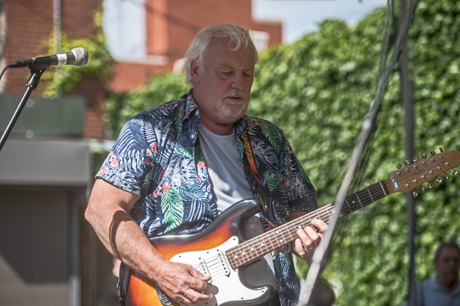It’s fair to say that Stephen Kowalcyk is intense about what he does.
He has a passion for all things music — from playing the drums to working on the production elements of shows big and small. He might be doing the sound and lighting for a small town bar one night and then for a James Taylor concert the next. It has been his life now for the last two decades.
“I was a drummer since I was a little kid and that's what got me into this. I originally started playing in bands in Jackson Square and bought some lights for my band that I was in, and then when that band broke up, people kept calling me to bring the lights to shows, and next thing I know, I realize I can make money at it. And 20 years later, I'm doing some of the biggest names in the country,” Kowalcyk said to The Batavian during the annual Ramble. “I’ve been in 40 states, toured as a lighting designer, I've been a drummer in some regional bands. I do sound and I'm a union stagehand for some of the biggest concerts at Darien Lake and the Sabres arena, the Blue Cross Arena. I've done in the past month everything from cover bands to Kenny Chesney. So that's what I do for a living.”
A Batavia resident and volunteer fireman with the Town of Batavia, he is a partner with Genesee Production Group, which is “basically a bunch of sole proprietors that all work together,” he said.
As Batavia Ramble hit its 15th year this past weekend, Kowalcyk wants to see the venue of Jackson Square get better and better. He and co-organizer Paul Draper, with help from Jordann Luce, had nothing but praise for how this last Ramble went. Record attendance, beautiful weather, a great line-up of talent and but a few “hiccups,” as Kowalcyk described them. The two-year pandemic break made for a small learning curve to get back up and running smoothly, he said.
This year featured input from GO ART!, which pleased the Ramble organizers, they said. A variety of cultures, performances, food and art lined Jackson Street for a good part of the day, with Ramble musicians finishing out the late evening in the Square. A basket raffle housed inside Eli Fish was to raise money for kids’ music lessons. That was a plan before Roxy’s owner Rose Caccamise died, and now Kowalcyk and Ramble co-organizer Paul Draper are looking for another nearby music store and teachers to help with the effort.
“We have a larger kids section this year than we've ever had, thanks to GO ART! And that has been extremely helpful. I've seen a lot more kids here than we have in the past,” he said. “So having kids here is something that we wanted to do before. But Paul and myself were never really good at that. We didn't know how to advertise for that and how to do that.”
All of the positives aside, Kowalcyk is perhaps a bit "protective," he said, about the space at Jackson Square and an impending redesign. The city has been awarded a Downtown Revitalization Initiative grant of $750,000 for a project to “transform public space in a public plaza.” Grant specs state that an upgraded plaza is to become a “lively hub and common space for community interaction” while also providing connections to multiple businesses throughout the alleyway.
Who's involved ...
Architectural Resources is the city's firm in charge of the redesign. The city hosted two public meetings in 2021 to gather input from community members regarding the space. The initial plan was to begin construction in the fall of 2021 for a revamped Square by the spring of this year. Bids for the work have been rejected twice due to not fitting the financial cap for the project. City Council more recently rescinded acceptance of a contractor after the company raised the initial bid.
Kowalcyk and Draper want very much to be part of the redesign process and feel that they have been left out in these final stages.
“I have my own opinion on how this area should be taken care of, as I played my first gig here 20 years ago. So it's kind of, it's very sensitive to me, this area's worries,” Kowalcyk said. “One of my first gigs ever was here in 2002-2003. I’ve been playing with bands since then. And it's actually been really huge to the music scene here. A lot of people my age can say that they played some of their first shows in Jackson Square. So it's very sentimental to people our age because in the early 2000s, that was one of the very few places that people that weren't 21 could play shows. So we don't want to see it turn into something that it's not … it's not an amphitheater, we know that. But we also know that being a free and open venue that the city allows us to use, it's a great asset to the city and to our music scene.”
Wanting to be more involved ...
Based on the last plans he was aware of, Kowalcyk heard that the roof would be made of glass, the stage wouldn’t be very high and a handicap-accessible ramp was targeted for the front of it. He appreciates that City Manager Rachael Tabelski “was very good to me once she realized how much it meant to us,” he said. But after those initial conversations with the design team, “there’s been no communications with us.”
“And obviously, I will straight up say, this is the largest event that happens in Jackson Square. We should be a part of the conversation on what happens with the design team. And I feel like we weren't a part of that initially until I kind of stuck my foot in the door and said, ‘Hey, we really need to be, you should listen to what we have to say. Because we have a lot of people that have a strong opinion on what happens back here.’”
The Batavian emailed questions to Tabelski, who said that her response is the same as it was when Kowalcyk and Draper spoke out in 2021. Input from citizens has been “heard and considered, and incorporated into the design,” she said, including those affiliated with the Ramble, which happens once a year.
“For the design side and bidding, we have to use a professionally licensed architect and engineer to complete the project for safety and liability reasons. The City will continue to look at the project and get the best outcome for the public gathering space and fulfill the DRI funding commitment,” Tabelski said. “Just like with many public works projects, after citizen input is solicited and incorporated, the design/engineering/construction process is managed by professional city staff. In this case, the project should already have been completed and I will be re-evaluating the architectural bid specs and seeking modifications so we can achieve an on-budget construction project that enhances Jackson Square.”
No throwing of stones, just suggestions ...
Well, if by chance the architects are listening, Kowalcyk wants to pitch his thoughts: no ramp right in front of performers and a solid roof for the stage “would prove beneficial.” Glass is a nice design element, he said, but given the open space with little shade, glass could make it unbearable for performers on a hot sunny day.
“We need shade at this time of year and almost every year when we do this. It's nearly the longest day of the year, and it's almost one of the hottest days of the year. Yeah, so we're looking for shade. That is the biggest thing,” he said. “Everyone knows that I'm a liaison between this event and the city, okay, so they've been coming to me, and I've been getting emails and phone calls and text messages saying you cannot let them go with a glass roof.”
Another complaint he’s been hearing is that a large portion of that $750,000 was going to replace the concrete and brick in Jackson Square. It wasn’t that long ago since it was last repaired, he said, and “really not that bad.”
“I hate to see the majority of our budget go to that aspect, where I don't think it's going to make that much of an improvement. The average person's not gonna come in there and see that much,” he said.
No disrespect to the design team, he said, but other missing elements (as far as he’s aware) include permanent lighting for night show options and a screen that could be pulled down for movies and other uses.
“With the right design of a stage, we could have built a little small AV corner to do that. And we're only talking hundreds of dollars, not thousands of dollars. It would have been easy to do the power button,” he said.
After speaking with a member of the City Council last year, Kowalcyk said he was told that the DRI grant was on a timeline and that money had to be spent and work completed to fulfill the requirements as a “use it or lose it” situation. The member had indicated that it would be better to “get it done and then fix it later.”
“And I’m like no, that is not how you do that. That is a PR nightmare; you do not fix it after the fact,” he said. “I would like to do it right the first time and not come back and try to fix it because, why spend the extra money?”
To be clear, this was one person’s remark to Kowalcyk and apparently not an official comment about the design team’s approach.
Other team players ...
Kowalcyk has a sincere interest in promoting and utilizing the Square for a full plate of events beyond the Ramble, he said. He hopes to work with the Batavia Business Improvement District for future Rambles and other ideas, as the Square is right in BID’s backyard. BID has hosted the Jackson Square Friday night music series for several years, plus some Thursday nights this summer.
The Batavia BID board is updated monthly on the project, and has provided feedback to the City through the process, Tabelski said. BID Executive Director Shannon Maute said Tuesday that she is “open to anything” that would benefit the downtown area. She didn’t know why Ramble and BID organizers ever stopped collaborating on the effort, but she would be willing to do so, Maute said.
As for the Jackson Square redesign, aside from cleaning up the area, leave well enough alone, she said. An old relic of the past, it's a nostalgic space that she appreciates.
“As for me personally, I want it the way it is … it’s one of the very few things unchanged in downtown. The stage has worked,” she said. “If the city wants to revamp it, I’m fine with that as well.”
Kowalcyk likewise wants to work with the BID, he said. His vision of the Ramble is to perhaps make it a two-day event. As for the venue, he’d like to include affairs beyond the current line-up, such as themed DJ, 80s, hip-hop nights and other genres.
“In the future, I see us actually being involved together, I fully plan on working with them. It just didn't happen this year, because we got far behind on where we wanted to be. GO ART! actually approached us to work together on this event. We've talked to them in the past and said that this would be a great event to work together on, and it didn't come to fruition. So this year it actually benefited both of us at the same time. It's been great working together; it’s fun.”
As co-organizer Paul Draper said, they believe Jackson Square is “a great space, a wonderful space, and it should be utilized to the maximum amount.”
“And we’ve just got to make sure that what they're planning is going to be able to benefit that, I guess,” Draper said. “I don't ever want to leave the square, I think this is a beautiful spot. It's just, you know, it's kitchy coo. For visibility, … I think we did a really, really good job. GO ART! is doing a fantastic job on the other end of it. So I'm happy with what we've been able to do so far. So going forward, just kind of what we've been doing is, changing, building up, seeing what works, what doesn't work, and kind of go from there. But I like what we have to offer this year.”
He and Kowalcyk agreed that one of the Square’s best-kept secrets — and not always fully recognized — is that it allows musicians that typically are in their own venues to get together, see one another and enjoy that rare time together.
“It's an interesting thing because a lot of us are in bands. We don't necessarily get to go out and see our friends that are in bands because we're in bands playing,” Draper said, as Kowalcyk admitted he had never thought of it that way.
“This is like the only time where we can actually see all our friends play in the same place,” Kowalcyk said. “That's actually really cool.”
Photo: Batavia Ramble organizers Stephen Kowalcyk, Jordann Luce, and Paul Draper take a moment on July 2 to pause during this year's music and arts festival at Jackson Square. Photo by Howard Owens.




































